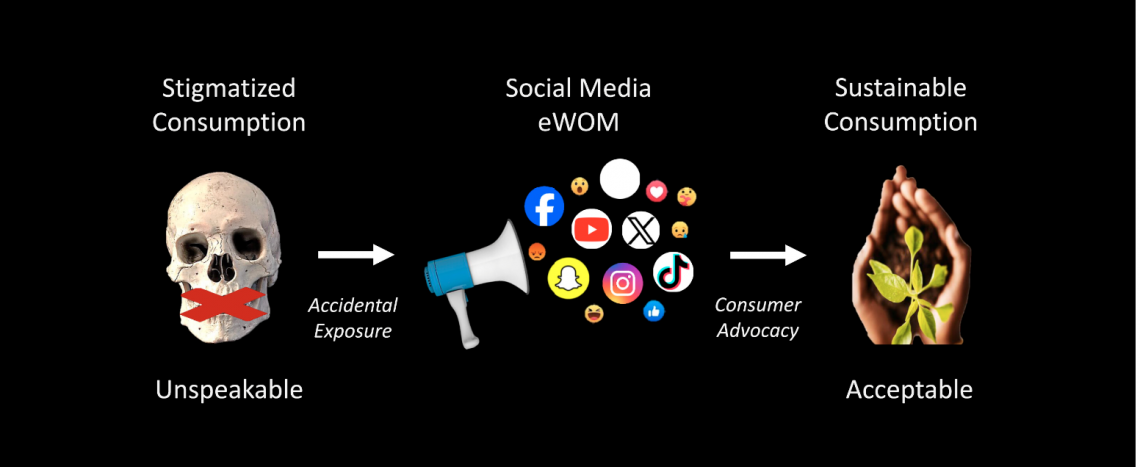Research Feature with Stephanie Villiers, Dr. Rumina Dhalla, and Jan Oberholzer

Stephanie Villiers is a current PhD student who has recently defended her thesis, Dr. Rumina Dhalla is the Director of the Institute for Sustainable Commerce and an associate professor in organizational studies and sustainable commerce in the Department of Management. This article was published in the Journal of Service Research and focuses on sustainable deathcare, a topic gaining momentum in North America.
Abstract
Entrepreneurs entering stigmatized markets face barriers to entry beyond those encountered in traditional markets. Yet, little research examines factors influencing the diffusion of these goods and services. Through the lens of institutional theory, this paper proposes and demonstrates the application of a conceptual model outlining the process by which stigmatized innovations become (de-)institutionalized. We combine mixed methods by blending qualitative with quantitative tools to analyze the legitimating influence of electronic word-of-mouth (eWOM) over time. Our findings suggest that dichotomized consumer preferences stem from normative (natural and benevolent versus artificial and malevolent), cultural-cognitive (ecological health and sustainable services versus public health and traditional services), and regulatory (government rule versus market rule) binaries that influence the deinstitutionalization of orthodoxy (utopian versus dystopian worldviews). Notwithstanding, we show that, in stigmatized markets, consumers look to eWOM to inform their choices, which can aid in deinstitutionalizing rational myths and help perpetuate service innovation. We also find that in stigmatized markets, the existing industry does not show a predictable response to societal pressures for service innovations that promote social wellbeing and sustainability.
Stigmatized markets encounter barriers to entry beyond those faced in traditional markets.
In the perspective of institutional theory, this research paper examines the utilization of a conceptual model outlining the process by which stigmatized innovations become deinstitutionalized. Both qualitative and quantitative tools are used to analyze the legitimate influence of electronic word-of-mouth (eWOM) over time. Their findings suggest that dichotomized consumer preferences stem from normative (natural and benevolent versus artificial and malevolent), cultural-cognitive (ecological health and sustainable services versus public health and traditional services), and regulatory (government rule versus market rule) binaries that influence the deinstitutionalization of orthodoxy (utopian versus dystopian worldviews). With this in mind, in stigmatized markets, consumers look to eWOM to inform their choices, which can help in deinstitutionalizing rational myths and help perpetuate service innovation. Their findings also suggest that in stigmatized markets, the existing industry does not show a predictable response to societal pressures for service innovations that promote social wellbeing and sustainability.
Consumers are usually reluctant to discuss taboo purchases.
In the past, the lack of dialouge with discussing taboo purchases fostered rational myths that inhibited innovation. In terms of ethics, some may argue that traditional practices arise from antiquated worldviews should not disrupt future generations. This research found that service providers operating in stigmatized markets have profited from rational myths and have little impetus to change, thus reinforcing the status quo. New sustainable service innovations may be the catalyst if the service becomes legitmized through regulation and acceptance by an increasing populace seeking service innovation. Frequently, consumers of service innovations in stigmatized markets belong to vulnerable or marginalized groups, and swaying perceptions within these industries require the minority to challenge the majority. Accidental exposure through eWOM offers a mechanism to do so without direct confrontation. The ensuring consumer discourses can help in legitimizing innovations by endorsing new services and moderating opposition. Particularly, since traditional service providers seem immune to political, mimetic, and normative isomorphic pressures, eWOM can help legitimate underdogs offering service innovations in stigmatized markets. In this sense, eWOM becomes a service innovation in and of itself- challenging, shaping, and creating markets for social wellbeing and sustainability.
Read the full research article here.